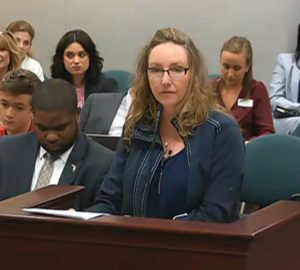
A proposal to create a new school choice program for violence victims stirred a passionate debate about bullying in the Florida Legislature.
Alyson Hochstedler told the House K-12 Innovation Subcommittee her son faced repeated harassment at his Tallahassee elementary school.
“At the time, I remember praying that each incident was the last,” she said. She said she asked school administrators to get him away from his tormentors or switch him to another class. When one of them punched him in the jaw, she knew she had to send him to a different school.
Her family eventually qualified for Florida tax credit scholarships.* That allowed her to send her son to a private Christian academy, where he thrived. Now, she said, she continues scraping together money and borrowing from relatives to keep him there.
She spoke in favor of House Bill 1, which would create a dedicated private school choice scholarship for children who face bullying or other violence in public schools. It would also allow them to transfer to another public school.
“It should never be incumbent upon a bullied child to stand on their own,” Hochstedler said. “Parents should be confident that their child is safe, so I appreciate this bill, and hope that this will help.”
But not everyone who testified shared her view.
Rep. Byron Donalds, R-Naples and sponsor of the Hope Scholarship bill, fielded nearly two hours of at times tough questions and contentious testimony.
Committee members, including Ranking Member Joseph Abruzzo, D-Wellington, asked why the state needed a new private school choice program. They questioned why parents couldn’t use existing options, like the open enrollment law the Legislature passed in 2016. “For me, it’s more about vouchers,” said Rep. Robert Acensio, D-Miami, said of the legislation. He later asked: “Aren’t there other options available to parents here?”
Donalds, however, noted the statewide open enrollment law requires parents to apply during specific times of the school year. Logistical hurdles might keep them from getting their children into a safer environment as quickly as possible. His goal, he said, is to give them another, potentially faster, avenue.
“It’s a parent-driven decision,” he repeated several times during the hearing. “What we’re doing in HB 1 is providing them the information where they can act effectively in the best interest of their child.”
Rep. Larry Lee, D-Port St. Lucie, said the issue is personal for him. He said a trio of boys repeatedly attacked him when he was a child. The incidents traumatized him and caused him to fail first grade. He said Florida needs more policies that address bullying. But he disagreed with the approach proposed in the bill. He said lawmakers should focus on bullies, not victims.
“They should have gotten those guys out of that school, because not only did they do that to me — they did it to others as well,” he said.
Representatives from the statewide teachers union, Equality Florida (an LGBT advocacy group) and the Southern Poverty Law Center echoed similar points. And they argued private schools might not be safer and aren’t required to have specific anti-bullying policies.
Donalds, however, said there are already anti-bullying laws on the books. He wants to give victims more options.
“We have policies throughout the state that address bullying, but bullying still happens,” he said. “What we’re doing by this measure is recognizing the fact that if a child does not feel safe in school … we’re just trying to provide them a pathway to get out, to go to another building, another environment, so that they can better themselves.”
Studies have found competitive pressure from private school choice leads to slight test score gains in public schools. And Rep. Ralph Massullo, R-Lecanto, said that in a similar vein, giving families more options would likely put pressure on school districts to make sure their anti-bullying policies actually work.
“They’re not going to want to lose students,” he said.
The committee approved the bill this afternoon on a 9-5, party-line vote. But Rep. Sam Killebrew, R-Winter Haven, who voted “yes,” said he might oppose it on the House floor.
*Step Up For Students, which publishes this blog, helps administer the tax credit scholarship program. It would also help administer the Hope Scholarship program if lawmakers create it.


